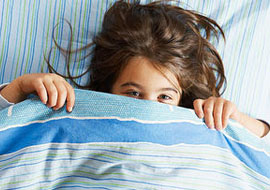Bed-wetting isn’t a sign of toilet training gone bad. It’s often just a normal part of a child’s development.
Bed-wetting is also known as nighttime incontinence or nocturnal enuresis. Generally, bed-wetting before age 7 isn’t a concern. At this age, your child may still be developing nighttime bladder control.
If bed-wetting continues, treat the problem with patience and understanding. Bladder training, moisture alarms or medication may help reduce bed-wetting.
Symptoms
Bed-wetting is involuntary urination while asleep after the age at which staying dry at night can be reasonably expected.
Most kids are fully toilet trained by age 5, but there’s really no target date for developing complete bladder control. Between the ages of 5 and 7, bed-wetting remains a problem for some children. After 7 years of age, a small number of children still wet the bed.
When to see a psychiatrist in Rohini, Pitampura, Shalimar Bagh, Delhi
Most children outgrow bed-wetting on their own — but some need a little help. In other cases, bed-wetting may be a sign of an underlying condition that needs medical attention.
Consult your psychiatrist in Pitampura, Rohini, Shalimar Bagh, Delhi if:
- Your child still wets the bed after age 7
- Your child starts to wet the bed after a few months or more of being dry at night
- Bed-wetting is accompanied by painful urination, unusual thirst, pink or red urine, hard stools, or snoring
Causes
No one knows for sure what causes bed-wetting, but various factors may play a role:
- A small bladder. Your child’s bladder may not be developed enough to hold urine produced during the night.
- Inability to recognize a full bladder. If the nerves that control the bladder are slow to mature, a full bladder may not wake your child — especially if your child is a deep sleeper.
- A hormone imbalance. During childhood, some kids don’t produce enough anti-diuretic hormone (ADH) to slow nighttime urine production.
- Stress. Stressful events — such as becoming a big brother or sister, starting a new school, or sleeping away from home — may trigger bed-wetting.
- Urinary tract infection. This infection can make it difficult for your child to control urination. Signs and symptoms may include bed-wetting, daytime accidents, frequent urination, red or pink urine, and pain during urination.
- Sleep apnea. Sometimes bed-wetting is a sign of obstructive sleep apnea, a condition in which the child’s breathing is interrupted during sleep — often due to inflamed or enlarged tonsils or adenoids. Other signs and symptoms may include snoring, frequent ear and sinus infections, sore throat, or daytime drowsiness.
- Diabetes. For a child who’s usually dry at night, bed-wetting may be the first sign of diabetes. Other signs and symptoms may include passing large amounts of urine at once, increased thirst, fatigue, and weight loss in spite of a good appetite.
- Chronic constipation. The same muscles are used to control urine and stool elimination. When constipation is long term, these muscles can become dysfunctional and contribute to bed-wetting at night.
- A structural problem in the urinary tract or nervous system. Rarely, bed-wetting is related to a defect in the child’s neurological system or urinary system.
Complications
Although frustrating, bed-wetting without a physical cause doesn’t pose any health risks. However, bed-wetting can create some issues for your child, including:
- Guilt and embarrassment, which can lead to low self-esteem
- Loss of opportunities for social activities, such as sleepovers and camp
- Rashes on the child’s bottom and genital area — especially if your child sleeps in wet underwear
Treatments and drugs
Most children outgrow bed-wetting on their own. If there’s a family history of bed-wetting, your child will probably stop bed-wetting around the age the parent stopped bed-wetting.
If your child isn’t especially bothered or embarrassed by an occasional wet night, traditional home remedies may work well. However, if your grade-schooler is terrified about wetting the bed during a sleepover, he or she may be more motivated to try additional treatments. The child’s and parents’ motivation can impact the selection of treatment and its success.
If found, underlying causes of bed-wetting, such as constipation or sleep apnea, should be addressed before other treatment.
Moisture alarms
These small, battery-operated devices — available without a prescription at most pharmacies — connect to a moisture-sensitive pad on your child’s pajamas or bedding. When the pad senses wetness, the alarm goes off.
Ideally, the moisture alarm sounds just as your child begins to urinate — in time to help your child wake, stop the urine stream and get to the toilet. If your child is a heavy sleeper, another person may need to listen for the alarm and wake the child.
If you try a moisture alarm, give it plenty of time. It often takes at least two weeks to see any type of response and up to 16 weeks to enjoy dry nights. Moisture alarms are effective for many children, carry a low risk of relapse or side effects, and may provide a better long-term solution than medication does. These devices are not typically covered by insurance.
Medication
As a last resort, your psychiatrist in Shalimar Bahg, Pitampura, Rohini, Delhi may prescribe medication to stop bed-wetting. Certain types of medication can:
- Slow nighttime urine production. The drug desmopressin (DDAVP, others) boosts levels of a natural hormone (anti-diuretic hormone, or ADH) that forces the body to make less urine at night. But drinking too much liquid with the medication can cause problems with low sodium levels in the blood and the potential for seizures. So drinking only 8 ounces (237 milliliters) of fluids with and after the medication is recommended. Don’t give your child this medication if he or she has a headache, has vomited or feels nauseated. Desmopressin also may be used in short-term situations, such as going to camp.
According to the Food and Drug Administration, nasal spray formulations of desmopressin (DDAVP Nasal Spray, DDAVP Rhinal Tube, others) are no longer recommended for treatment of bed-wetting due to the risk of serious side effects.
- Calm the bladder. If your child has a small bladder, an anticholinergic drug such as oxybutynin (Ditropan XL) may help reduce bladder contractions and increase bladder capacity. This medication is usually used in combination with other medications and is generally recommended only when other treatments have failed.
Sometimes a combination of medications is most effective. There are no guarantees, however, and medication doesn’t cure the problem. Bed-wetting typically resumes when medication is stopped.
Lifestyle and home remedies
Here are changes you can make at home that may help:
- Limit how much your child drinks in the evening. It’s important to get enough fluids, so there’s no need to limit how much your child drinks in a day. However, encourage your child to focus on drinking liquids in the morning and early afternoon, which may reduce thirst in the evening. But don’t limit evening fluids if your child participates in sports practice or games in the evenings.
- Avoid beverages and foods with caffeine. Beverages with caffeine are discouraged for children at any time of day. Because caffeine may stimulate the bladder, it’s especially discouraged in the evening.
- Encourage double voiding before bed. Double voiding is urinating at the beginning of the bedtime routine and then again just before falling asleep. Remind your child that it’s OK to use the toilet during the night if needed. Use small night lights, so your child can easily find the way between the bedroom and bathroom.
- Encourage regular toilet use throughout the day. During the day and evening, suggest that your child urinate every two hours or so, or at least often enough to avoid a feeling of urgency.
- Treat constipation. If constipation is a problem for your child, your doctor may recommend a stool softener.
- Prevent rashes. To prevent a rash caused by wet underpants, help your child rinse his or her bottom and genital area every morning. It also may help to cover the affected area with a protective moisture barrier ointment or cream at bedtime. Ask your pediatrician for product recommendations.


